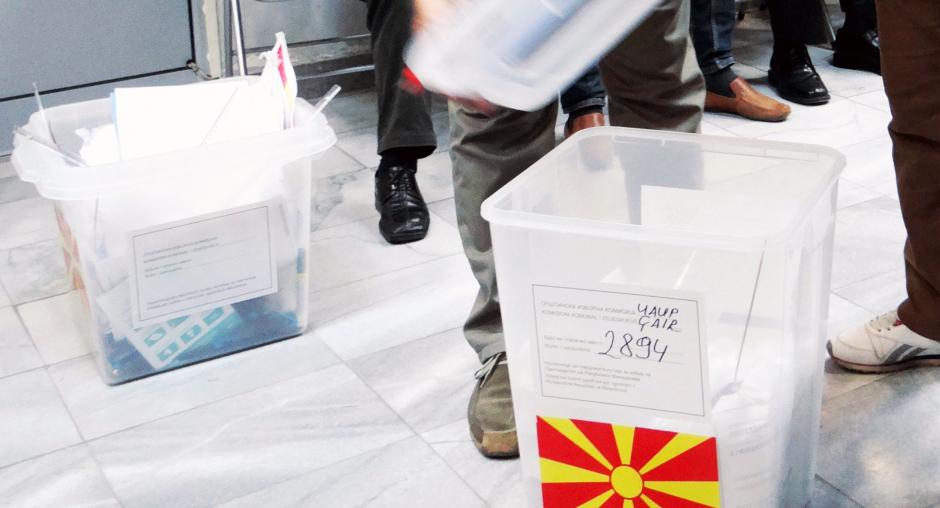Presidential candidates able to campaign freely and fundamental freedoms respected, but campaign playing field not level, international observers say in Skopje

SKOPJE, 14 April 2014 – Fundamental freedoms were respected and candidates were able to campaign freely in the efficiently administered 13 April 2014 presidential election in the former Yugoslav Republic of Macedonia, although biased and unbalanced media coverage and a blurring of state and party activities created an unbalanced playing field, international observers said in a statement issued today.
“The campaign was active and the candidates engaged in a vigorous schedule of rallies, however, the playing field was not level,” said Ambassador Geert-Hinrich Ahrens, Head of the election observation mission from the OSCE Office for Democratic Institutions and Human Rights (OSCE/ODIHR). “This is one of the issues we will continue to look at by observing the campaign and the media coverage in the lead-up to the early parliamentary elections and the second round of the presidential vote in two weeks, for which we will also be joined by 160 short-term observers.”
In general, the State Electoral Commission (SEC) functioned efficiently and most of its sessions were open to observers and the media, although tensions were evident when particular members made political statements or when voting on politically contentious issues followed party lines. In addition, the SEC failed to communicate effectively with the Municipal Election Commissions, causing some confusion regarding procedures.
Despite the large number of media outlets, many stakeholders with whom the observers met alleged there is indirect control over the media by the ruling party, through the government’s dominance in the advertising market. There was a lack of political analysis and independent reporting, and the public broadcaster failed to provide balanced coverage.
The incumbent enjoyed a significant advantage in resources and predominance in paid advertising. The government’s clear support during the campaign did not fully respect the separation of party and the state.
“The conduct of the campaign divided society along ethnic lines, and the call by one ethnic-Albanian party on members of this community not to vote is a matter of concern,” said Stefan Schennach, Head of the delegation from the Parliamentary Assembly of the Council of Europe (PACE). “We also saw instances of organized voting, as well as some small procedural irregularities. These issues cast a shadow over what was largely a well-conducted process on election day.”
Four candidates were registered and the campaign was active. Although the tone of campaigning was mostly moderate, negative rhetoric was heard increasingly from the governing and main opposition parties as the campaign progressed. There was a stream of strong negative allegations within the ethnic-Albanian bloc, as well as an appeal not to vote made by one party to ethnic Albanians.
All four candidates were men. While gender-representation criteria were respected in election-administration bodies, gender issues were not addressed in candidates’ programmes.
Recent amendments to the Electoral Code addressed some recommendations from prior OSCE/ODIHR election reports. Although their introduction less than a year before, this election went against good practice, they enjoyed cross-party support and were passed following public consultations. A number of inconsistencies and issues of concern remain, however. The 40 percent turnout requirement in the second round of the presidential contest could lead to cycles of failed elections, and the lengthy residency requirement for candidates contradicts OSCE commitments and Council of Europe standards and other international obligations.
The mechanism for resolving electoral disputes is ineffective. In addition, the lack of deadlines for the resolution of election-related cases does not guarantee timely legal redress and voters can only challenge decisions on voter registration and the violation of their voting rights on election day.
On election day, the administration in the limited number of polling stations visited was procedurally well-prepared and the voting process was administered efficiently. However, in one municipality the voting process was problematic and a greater number of irregularities were noted. The vote count was carried out in a professional and transparent manner. The tabulation process was generally well organized, although there were many small discrepancies in the results protocols, which were corrected by the MECs.
For further information contact:
Thomas Rymer, OSCE/ODIHR, +389 (0)77 594 451 or +48 609 522 266, thomas.rymer@odihr.pl
or
PACE Communication Division, +33 388 413 193
